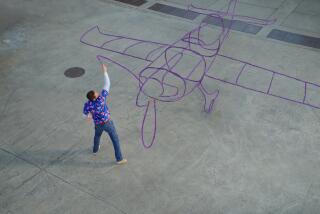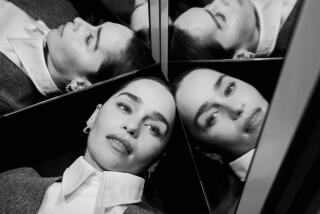BOOK REVIEW FICTION : A Magical Glimpse at Life Experiences From Inside a Boy’s Head : PADDY CLARKE HA HA HA <i> by Roddy Doyle</i> . Viking: $20.95, 282 pages
- Share via
Ten-year-old Paddy Clarke is surprised to be shaking hands with Henno, his hated schoolteacher. For a week, Paddy has been an excellent student, he tells us in this first-person novel, and as a result he has been promoted to the front of the class.
He is now sitting next to David Geraghty, the never-criticized smart boy with polio, and Henno has called Paddy “Good man,” the same phrase used by Patrick Clarke Sr. when Paddy, his eldest, has done something well.
What neither the teacher, nor the father--nor Paddy’s mother--knows is the cause of the boy’s much improved performance: He is forcing himself to stay up late doing homework, preparing even lessons that haven’t been assigned, in order to eavesdrop on his parents’ escalating fights and, occasionally, to avert them.
Children as a rule don’t read novels that win Britain’s prestigious Booker Prize (as this one did in October), and chances are they won’t read this one, either. They’d consider it too obvious, too boring.
For the rest of us, though, “Paddy Clarke Ha Ha Ha” will come as a bit of a shock, for the novel is an utterly convincing recreation of the life and ways of a 10-year-old.
It’s a tour de force, although not the sort of technical feat that term often implies. Its force comes because Roddy Doyle writes with such enormous feeling for the residents of fictional Barrytown, Ireland.
Paddy is a very ordinary boy going through very ordinary experiences, and that’s exactly what makes “Paddy Clarke Ha Ha Ha” so good--Doyle’s finding the magic, significance and gravity inherent in pre-adolescent teasing, neighborhood clubs, petty shoplifting and schoolyard fights with former best friends.
Doyle is a fine humorist and an essentially romantic one, as he showed in his Barrytown Trilogy (the novels “The Commitments,” “The Snapper” and “The Van”). This novel, oddly, is more serious, for Doyle--who knows a thing or two about children, having taught school in Dublin for 14 years--understands the extreme seriousness of childhood for those experiencing it.
The most remarkable thing about “Paddy Clarke Ha Ha Ha,” however, is that Doyle gets the tone just right: There’s no melodrama here, no false tears, no moralizing, no Dickensian uplift. The closest Doyle gets to giving the novel the literary weight we expect of Booker winners is when he has Paddy say, “Sometimes when nothing happened, it was really getting ready to happen.”
Doyle has almost dispensed with plot and drives the story forward instead by two themes: the urbanization of Barrytown in the 1960s and the growing intensity of the Clarkes’ quarrels. The former is a positive development to Paddy, because it brings construction sites from which to pilfer interesting things and tough “project boys” to emulate. The latter is a horror too terrible to contemplate. Paddy brings it up only because he can’t avoid it; he feels very brave simply acknowledging his parents’ battles.
His little brother, Francis--known to Paddy as Sinbad--pretends not to hear them at all; when Sinbad does, finally, it infuriates Paddy because it brings his own fears to light.
The scenes between Paddy and Sinbad are among the funniest in the book, but their dead-on realism can also give them a somber depth. When Sinbad grants the existence of parental fights, Paddy attempts to restore Sinbad to his little-brother place by saying menacingly, “I’m going to strangle you”--and only heightens the threat by adding: “But first I’m going to the Ptoilet.”
Later he imagines Sinbad dead and thinks, “It was nice, missing Sinbad,” even as he concedes: “Big brothers hated their little brothers. They had to.” Little brothers can be useful, though: When Paddy decides to become a selfless missionary, like Hawaii’s Father Damien, Sinbad is easily coerced into the role of thankful, groveling leper.
One can cite any number of scenes in “Paddy Clarke Ha Ha Ha” that capture its perfect pitch: the school episode in which Paddy dares to finish a “Gobstopper” (a Jaw Breaker-type of candy, apparently) before Hanno returns to class, or the post-crime interlude in which Paddy and his gang decide that stealing Football Monthly probably rated 4 million years in Purgatory but Goal and Football Weekly a mere 2 million.
But this novel is greater than the sum of its scenes. Doyle has blinded himself to adulthood in writing “Paddy Clarke Ha Ha Ha,” and the mature, grounded perspective he leaves out is just as important to its realization as the youthful, inexperienced views he puts in.
At one point, Paddy asks his parents why the Yanks in Vietnam are fighting “gorillas.” They laugh, charmed, but Paddy is humiliated because the joke, from his viewpoint, isn’t about a mistaken word; it’s about “being caught,” about having “given something away.”
Paddy quickly forgives his parents, because he knows they aren’t really making fun of him. He sees a stark contrast with school, because “That was what school was all about, not being caught and watching others getting caught instead.”
It’s a child’s view, absurd--or so it seems until you think about it and begin to wonder if adulthood really might be a series of rationalizations. Doyle probably didn’t intend this novel to be thought-provoking, but in Paddy Clarke, he has made one child, one of tens of millions, well worth listening to.
More to Read
Sign up for our Book Club newsletter
Get the latest news, events and more from the Los Angeles Times Book Club, and help us get L.A. reading and talking.
You may occasionally receive promotional content from the Los Angeles Times.









